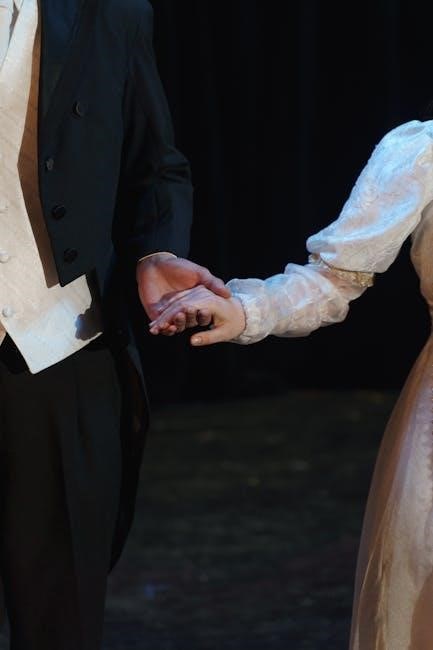Act 3 transitions to the courtroom, escalating tension as John Proctor and Mary Warren confront the court, setting the stage for tragic consequences.
1.1. Setting and Context
Act 3 shifts from private homes to the Salem meeting house, now a tense courtroom. The setting intensifies the drama, reflecting the merging of religious and legal authority. The courtroom’s formal yet oppressive atmosphere highlights the escalating hysteria and the community’s fear-driven mindset, central to the act’s unfolding events.
1.2. Key Characters in Act 3
Key characters in Act 3 include John Proctor, Mary Warren, and Reverend Parris. Proctor takes center stage, risking his reputation to exonerate Elizabeth. Mary Warren, torn by guilt, testifies against the girls’ deception. Parris, as a demagogue, enforces his authority, further fueling the hysteria. These characters drive the act’s tension and highlight the moral dilemmas of the Salem witch trials.
John Proctor’s Attempt to Exonerate Elizabeth
Proctor risks his reputation by testifying in court to save Elizabeth, revealing his affair with Abigail to discredit her accusations and prove Elizabeth’s innocence.
2.1. Proctor’s Decision to Testify
John Proctor decides to testify in court to save Elizabeth, driven by desperation and love. He risks his reputation by revealing his affair with Abigail, hoping to expose her deceit and discredit her accusations. This bold move underscores his moral struggle and commitment to justice, despite the personal costs. His decision marks a pivotal moment in the play.
2.2. Mary Warren’s Role in the Court
Mary Warren, once a conflicted servant, takes a stand in court, testifying that the girls’ accusations were fraudulent. Her initial courage falters under intense questioning from Danforth, leading her to recant. Her testimony, though brave, ultimately fails to sway the court, highlighting the overwhelming fear and hysteria that dominate Salem. Her role underscores the fragility of truth in a society gripped by fear.
The Courtroom Dynamics in Act 3
Tension escalates in the courtroom as fear and hysteria dominate. The court’s strict control and the community’s witchcraft paranoia create a volatile atmosphere, heightening dramatic conflict.
3.1. Danforth’s Authority and Bias
Danforth, as the Deputy Governor, wields absolute authority in court, displaying clear bias. He dismisses any challenge to the court’s legitimacy, equating dissent with heresy; His rigid belief in the girls’ truth and refusal to consider evidence of fraud solidifies the witch hunt’s momentum, making impartial justice impossible and enabling further hysteria.
3.2. The Examination of Martha Corey
Martha Corey’s examination highlights the court’s relentless pursuit of convictions. Despite her calm demeanor, the court interprets her nervous habits as signs of guilt. The lack of concrete evidence doesn’t deter Danforth, showcasing the court’s reliance on superstition over reason. Her steadfast denial only intensifies suspicion, exemplifying the witch trials’ kangaroo nature.

Proctor’s Confrontation with Abigail
Proctor confronts Abigail, exposing their affair and accusing her of manipulating the trials through jealousy, while Abigail remains defiant, refusing to acknowledge her deceit.
4.1. Proctor’s Admission of the Affair
In a desperate attempt to save his wife, Proctor publicly admits his past affair with Abigail, exposing his personal sin. This revelation aims to discredit Abigail’s credibility and reveal her motives for accusing Elizabeth. Proctor’s confession showcases his moral struggle and willingness to sacrifice his reputation to uncover the truth.
4.2. Abigail’s Reaction and Defiance
Abigail reacts with furious defiance, denying Proctor’s admission of their affair and accusing him of lying. Her determination to maintain her false accusations intensifies the conflict, showcasing her relentless pursuit of power and revenge.
Abigail’s defiance highlights her manipulative nature, as she attempts to discredit Proctor while preserving her own reputation, further escalating the dramatic tension in the courtroom.

Themes in Act 3
Justice and injustice dominate as the court’s bias and hysteria prevail, while deception and betrayal unravel relationships, highlighting the destructive power of lies and false accusations.
5.1. Justice and Injustice in Salem
In Act 3, Salem’s justice system is exposed as deeply flawed. The court, driven by fear and hysteria, disregards evidence and silences dissent, leading to unjust verdicts. Proctor’s futile attempts to expose Abigail’s deception highlight the moral decay, as authority figures like Danforth prioritize maintaining power over uncovering truth, perpetuating a cycle of injustice and fear.
5.2. Deception and Betrayal
Act 3 underscores the pervasive deception and betrayal in Salem. Abigail’s false accusations and manipulation of the court exemplify her deceit, while Mary Warren’s initial lies and later confession reveal the fragility of truth. Proctor’s admission of his affair exposes personal betrayal, further entangling the community in a web of distrust. The court’s refusal to believe truthful testimony deepens the chaos, highlighting the destructive power of deception.
The Aftermath of Proctor’s Confession
Proctor’s confession sparks intense emotional turmoil and skepticism, as the court questions his credibility, further entangling the community in distrust and escalating the tragic momentum.
6.1. Proctor’s Internal Struggle
Proctor grapples with profound guilt and moral conflict, tormented by his past affair with Abigail. His decision to confess Elizabeth’s innocence sparks internal turmoil, as he resists the pressure to admit wrongdoing. Despite Mary Warren’s encouragement, Proctor’s pride and fear of public shame create a fierce battle within him, ultimately leading to a tragic realization of his own vulnerability and the futility of his efforts.
6.2. The Court’s Response to Proctor’s Testimony
Danforth remains unmoved by Proctor’s testimony, viewing it as an attempt to undermine the court’s authority. The court dismisses Mary Warren’s confession, labeling her unreliable. Proctor’s admission of the affair further damages his credibility, as the court interprets it as a desperate ploy. Despite his pleas, the court demands a formal confession, refusing to accept his honesty, thereby sealing his fate and deepening the tragic inevitability of the proceedings.

Reverend Parris’s Role in Act 3
Reverend Parris emerges as a demagogue, using fear and self-interest to control the narrative. He labels challenges to the court as challenges to God, solidifying his authority.
7.1. Parris as a Demagogue
Reverend Parris acts as a demagogue in Act 3, using fear and manipulation to maintain control. He labels any challenge to the court as a challenge to God, framing dissent as heresy. His self-interest and fear of losing authority drive his actions, as he aligns himself with the court’s authority to protect his reputation and power in Salem.
7.2. Parris’s Motivations and Fears
Reverend Parris is driven by self-preservation and fear of losing his position in Salem. His primary motivation is to maintain his authority and reputation, fearing that any questioning of the trials could expose his own vulnerabilities. Parris’s fear of being implicated in the hysteria fuels his aggressive defense of the court, revealing a man more concerned with personal survival than justice or truth.

The Significance of Act 3 in the Play
Act 3 heightens dramatic tension, revealing the destructive power of unchecked hysteria and false accusations, while setting the stage for the play’s tragic and inevitable conclusion.
8.1. Escalation of Tension
Act 3 intensifies the play’s tension as Proctor confronts Abigail, and Mary Warren’s testimony falters under pressure. The courtroom’s hostile atmosphere, driven by Danforth’s rigid authority, escalates the conflict, highlighting the devastating consequences of unchecked hysteria and false accusations. This escalation propels the narrative toward its tragic conclusion, deepening the emotional and dramatic stakes for the characters and the community.
8.2. Foreshadowing of Tragic Events
Act 3 foreshadows the impending tragedy through Proctor’s desperate attempts to expose Abigail’s deceit and the court’s refusal to accept reason. Mary Warren’s faltering testimony and the judges’ unwavering belief in the girls’ accusations signal the inevitability of Proctor’s doom. The atmosphere of fear and paranoia escalates, hinting at the devastating consequences that will unfold, leaving the audience bracing for the heartbreaking conclusion.
Mary Warren’s Testimony
Mary Warren enters the courtroom with Proctor, aiming to expose the fraud but falters under pressure, failing to convince, leading to Proctor’s disbelief and the case turning against him.
9.1. Mary’s Confession of Fraud
Mary Warren, pressured by Proctor, enters the courtroom to confess the girls’ fraudulent accusations. She admits the witchcraft claims were feigned, revealing Abigail’s manipulation. However, her nervous demeanor undermines her credibility, as she falters under Danforth’s intense questioning and the court’s skepticism, leading to her testimony being dismissed as unreliable.
9.2. The Impact of Her Testimony
Mary’s confession fails to sway the court, as Danforth views her as a dishonest servant. Her testimony inadvertently strengthens Abigail’s case, further entrenching the court’s belief in the girls’ sincerity. Proctor’s credibility is tarnished, and the trials’ momentum toward hysteria intensifies, sealing the fate of the accused and highlighting the destructive power of unchecked fear and deception in Salem.
Act 3 of The Crucible is pivotal, highlighting the destructive power of hysteria, injustice, and deception. It underscores the tragic downfall of John Proctor, setting the stage for the play’s devastating conclusion.
10.1. Summary of Key Events
Act 3 sees John Proctor attempting to exonerate Elizabeth, with Mary Warren confessing the girls’ fraud. Proctor admits his affair with Abigail, but she denies it, leading to his condemnation. Martha Corey is examined and found guilty, highlighting the court’s bias. These events escalate tension and foreshadow tragic outcomes, marking a turning point in the play’s descent into chaos and injustice.
10.2. Relevance of Act 3 to the Play’s Themes
Act 3 underscores the corrupt justice system, highlighting themes of hysteria, deception, and the destructive power of unchecked authority. Proctor’s struggle and the court’s refusal to acknowledge truth reveal the dangers of fear-driven societies. The act intensifies the moral decay, showcasing how lies and intimidation dismantle integrity, reinforcing Miller’s critique of mass hysteria and the erosion of justice.

No Responses